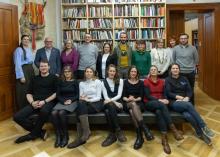History
The Institute of Slovenian Ethnology (ISE) ZRC SAZU is one of the central ethnological institutions in Slovenia. It was established in 1951, and its beginnings reach back to 1947, when the Commission for Slovenian Ethnography was founded at the Academy of Sciences and Arts (SAZU).
The Institute initially operated in modest conditions and with honorary staff. The first full-time researchers were Milko Matičetov (1952) and Niko Kuret (1954), who laid the foundations for the sections on folklore and folk customs and games. Already in the 1950s, the Institute expanded its contacts with colleagues in the field, and among other things initiated the Alpes Orientales, a working community of Eastern Alpine ethnologists.
In the following decades, his research expanded to material culture, musical ethnography from 1972 to 1994, and ethnological film from the 1980s onwards.
Through decades of expanding its research fields and employing new staff it has grown into an institution that devotes its basic and applied research to all fields of modern ethnology, especially within Slovenian ethnic territory.
As part of their ethnological research, the institute’s researchers focus on the following themes: economy, architecture, ways of living, food, family, kinship and other forms of community life, local cultures, interethnic contacts and relationships, manners and customs, rituals, folk narrative, literary folklore, beliefs and other cultural phenomena of intangible cultural heritage. They also deal with visual anthropology, history, and ethnological theory as well as ethnological terminology.
The institute maintains extensive collections of archival material, sound and visual documentation, material on current research projects, and a large ethnological library. The Audiovisual Laboratory with its rich visual documentation and film material is a special unit of the ISE.
In 2021, the institute has celebrated its 70th anniversary.

The Institute today
Today, the Institute is one of the main ethnological institutions in Slovenia. It develops basic and applied research on ethnological and folkloristic topics, linking the Institute's research tradition with contemporary studies of cultural transformations. The colleagues disseminate their findings as lecturers at Slovenian universities and abroad, participate in international research and scientific associations, and publish in national and international scientific publications.
The Institute has extensive collections of archival material, audio and visual documentation, ongoing research material and an ethnological library. The Institute has an Audiovisual Laboratory with extensive visual documentation and film material. The Institute's collaborators work at the ZRC SAZU Maribor Research Station and the ZRC SAZU Nova Gorica Research Station.
Book and audiovisual collections
The Institute of Slovene Ethnology publishes the book collections Opera ethnologica Slovenica (since 2003), Slovene Fairy Tales (since 2010) and Ethnologica - Dissertationes (since 2011) and the audiovisual collection Images of Science (since 1996). Together with the Institute of Ethnomusicology and the Slovenian Academy of Sciences and Arts, it publishes the journal Traditiones (since 1972), and with the Institute of Archaeology and the Department of Languages and Cultures of Central-Eastern Europe of the University of Udine, the journal Studia mythologica Slavica (since 1998). The latter is followed by the book collection Studia mythologica Slavica - Supplementa (since 2004).
A selection of films produced in the Audiovisual Laboratory are published online.